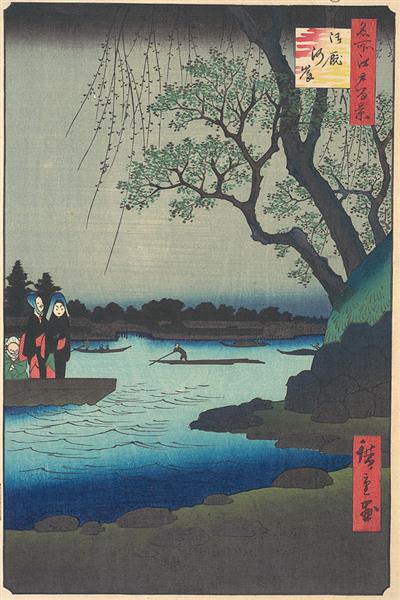Opis
Obraz "105. Oumayagashi - 1857" autorstwa Utagawy Hiroshige jest wspaniałym przykładem mistrzostwa artysty w gatunku ukiyo-e, który rozkwitał w Japonii w okresie Edo. Ten obraz, część serii „Sto widoków Edo”, nie tylko uchwyca efemeryczną urodę japońskiego krajobrazu, ale także odzwierciedla głęboką więź Hiroshige z naturą i codziennym życiem jego czasów.
Kompozycja "Oumayagashi" ujawnia staranną uwagę poświęconą perspektywie oraz relacji między elementami naturalnymi a ludzkimi. Na obrazie przedstawiony jest most łączący dwa brzegi, struktura, która sugeruje przejście i upływ czasu, niemal jak symbol samego życia. Hiroshige mistrzowsko bawi się perspektywą, pozwalając mostowi stać się centralnym elementem, który prowadzi wzrok widza w podróż przez dzieło. Postacie ludzkie, choć małe w porównaniu z krajobrazem, wkomponowują się w sposób organiczny, a ich obecność nadaje poczucie skali i ruchu, jakby przechodnie dzielili tę przestrzeń życiową w harmonii z otoczeniem.
Użycie koloru w tym obrazie to kolejna wyróżniająca cecha pracy Hiroshige. Paleta obejmuje delikatne odcienie, które przechodzą od błękitów wody po zielenie i brązy roślinności otaczającej krajobraz. Niebo jest zapisane tonalną gradacją, która podkreśla porę dnia, ukazując moment spokoju, być może o zachodzie słońca, co nadaje dziełu atmosferę spokoju i kontemplacji. Szczegóły w przedstawieniu fal wody, jak również w łagodnej roślinności, pokazują jego uwagę na niuanse, które ożywiają krajobraz, przywołując niemal dotykowe wrażenie.
Jednym z najbardziej fascynujących aspektów "Oumayagashi" jest symbolika, która przenika dzieło. Hiroshige często kojarzy się z naturą, a ten utwór nie jest wyjątkiem. Przedstawiając most nad wodą, artysta sugeruje nie tylko fizyczne połączenie między dwoma miejscami, ale także emocjonalne i duchowe powiązanie między człowiekiem a jego otoczeniem. W kontekście sztuki japońskiej te elementy często niosą ze sobą konotacje przejrzystości i piękna w efemeryczności, pojęcia głęboko zakorzenione w japońskiej filozofii.
Utagawa Hiroshige, znany z umiejętności uchwycenia istoty każdej pory roku i miejskiego życia Edo, nadal ma trwały wpływ na historię sztuki. Jego charakterystyczny styl cechuje liryczne podejście do krajobrazu, gdzie każde dzieło jest odzwierciedleniem jego przenikliwej obserwacji oraz zrozumienia światła i atmosfery. "Oumayagashi" jest zatem nie tylko wizualną reprezentacją, ale także eksploracją ludzkiego doświadczenia w relacji z naturą.
Ten obraz wpisuje się w inne prace Hiroshige, które celebrują piękno codzienności i przejścia pór roku, takie jak "Wielka fala w Kanagawie" Hokusai, chociaż każdy z nich ma unikalne podejście. Podczas gdy Hokusai ma tendencję do podkreślania siły natury, Hiroshige zanurza się w harmonii i pokoju, które można znaleźć w codziennych momentach.
W dziele "105. Oumayagashi - 1857" widz nie tylko spotyka obraz spokojnego krajobrazu, ale także jest zaproszony do refleksji nad własnym związkiem z otoczeniem. To dzieło pozostaje świadectwem zdolności sztuki do transcendentnego wyrażania czasu i łączenia nas z uniwersalnymi prawdami ludzkiego doświadczenia, ujawniając w ten sposób trwałą genialność Utagawy Hiroshige.
KUADROS ©, słynny obraz na twojej ścianie.
Reprodukcje obrazów olejnych wykonane ręcznie, z jakością profesjonalnych artystów i charakterystycznym znakiem KUADROS ©.
Usługa reprodukcji obrazów z gwarancją satysfakcji. Jeśli nie będziesz całkowicie zadowolony z repliki swojego obrazu, zwrócimy Ci 100% pieniędzy.

